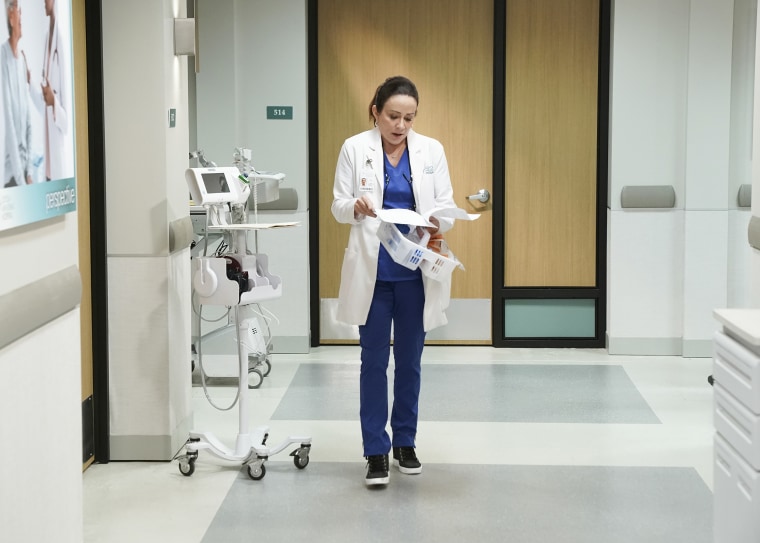Medical shows have become a staple of prime-time television. New iterations are regularly slated for release as networks jostle for ratings and attempt to unearth a show on a par with genre-defining shows like “ER,” “House” or “Grey’s Anatomy.”
Apart from the necessary dollops of drama, intrigue and romance that make for great television, these shows, however flawed, provide viewers a glimpse into the frailties of the human body and reveal various aspects of health care through their sometimes-quirky, sometimes-cruel protagonists.
While recent entries like Fox’s “The Resident”and NBC’s “New Amsterdam” have found success with storylines that dangerously stoke mistrust of medicine and doctors, the new CBS show “Carol’s Second Act,” has opted to depict a different trend in medicine that has so far gone unexplored on the small screen.
In the show, which premieres Thursday night, Patricia Heaton (of “Everybody Loves Raymond” and “The Middle” fame) stars as Carol Kenney, a 50-year-old divorcée who is now pursuing a career in medicine after raising her children and retiring from teaching. The show follows her journey as an internal medicine intern at the fictional Loyola Memorial Hospital. (Interns are recent medical school graduates in their first year of clinical training.)
Given Heaton’s comedic acting chops, it’s not surprising that Kenney’s character makes a lot of self-deprecating jokes about her age. But though Loyola Memorial does not exist, Kenney represents a real and growing demographic in medicine. While the average age of those entering medical school has remained 24, the number of students beginning the grueling process at 26 or older is now approximately 17 percent, an uptick from 10 percent in 2007. And with this spectrum of ages comes an even greater spectrum of backgrounds: designers, teachers, lawyers, musicians, firefighters, etc.
But while it may make for comedy onscreen, older doctors with nontraditional backgrounds can offer patients and colleagues considerable advantages. For one thing, older medical students with disparate pasts often have strong emotional resilience and a greater sensitivity toward patients. These intangibles not only aid a successful career reinvention, they can also provide an edge over younger counterparts. As 46-year-old intern David Burns noted in The New England Journal of Medicine: “For most interns, this is the first job they’ve ever had. They have no concept of being a professional. When you’re an older student, you have a different perspective. You spend less time whining that the world is unfair.”
The rigors of medical training become evident pretty much immediately. Interminable hours, spotty sleep and constant stress buffet interns daily. And once such days begin to repeat themselves, anxiety, depression and burnout can mount.
Here, too, older interns may have an advantage. Promisingly, studies have found that older, mature medical students ease into clinical practice more seamlessly than younger students. The transition is less confusing and intimidating because older students can tap into their wider life experiences.
Based on these past experiences, older interns have demonstrated an ability to adapt their roles to patient needs, according to a 2017 article. They may also show less reluctance to interact with patients, worry less about perfection and care more about learning from the encounters. Even interacting with other health care professionals is easier for this class of green physicians as they may feel less stifled by the hierarchical nature of medical training.
We see this phenomenon highlighted in the trailer for “Carol’s Second Act” when Kenney advises her co-intern, who is shaken by the prospect of having to inform his patient of particularly grim news. She tells him to “draw from your own experience” during the interaction. Kenney also interacts with her chief resident without the hesitation or obsequiousness that can unhelpfully color the resident-intern power dynamic.
This overall willingness to take initiative and embrace autonomy can lead to better doctoring. A study showed that confidence, derived from an ability to communicate, self-reflect and relate to patients actually improves diagnostic skills.
While medicine is quite obviously steeped in science, a former life also benefits newly minted doctors. A 2018 survey found that those medical students with past humanities experience scored higher on metrics such as empathy, emotional intelligence, resourcefulness, tolerance of ambiguity and wisdom. More important, this background also mitigated burnout.
As writer and physician Danielle Ofri noted in Slate last year: “We need human thoughtfulness to help us make sense of the readily available facts. We need human wisdom to help us wrestle with the complex decisions illness forces us to make. … It’s that we want — and need — the ability to grapple with nuance and ambiguity that are inherent when our bodies and minds fail.”
In a country that is becoming increasingly diverse, diversity in medicine is increasingly important. That means working to carve paths to medical school for all Americans — and dismissing the idea that the best doctors must possess an Ivy League pedigree.
The recent story of Carl Allamby, a former car mechanic from East Cleveland who graduated from medical school at 47, encapsulates this. Allamby, who has been lauded for his people skills as an emergency medicine intern at Cleveland Clinic Akron General Hospital, reflected on what his presence in a hospital means, especially for black patients. “There are so many times throughout the different hospitals where I will walk in and [a black patient] will say, ‘Thank God there’s finally a brother here,’” Allamby said.
While the intern year of medical residency surely makes for compelling television, “Carol’s Second Act” adds something new, and dare I say productive, to the crowded genre. The show is a reminder that there is more than one path to medical school. And that the best hospitals — and doctors — understand some skills can't be learned in a textbook.


